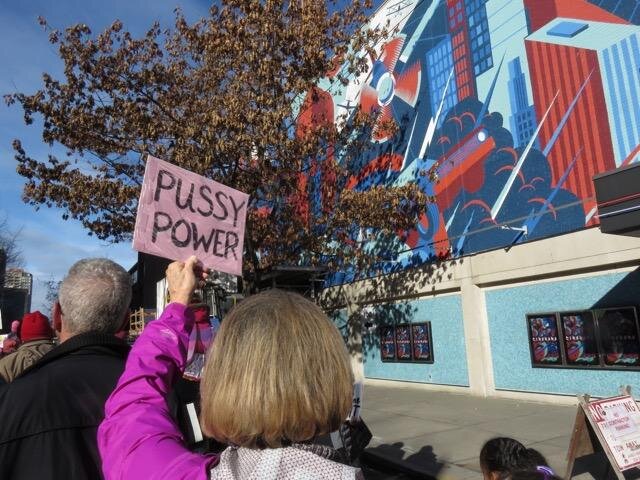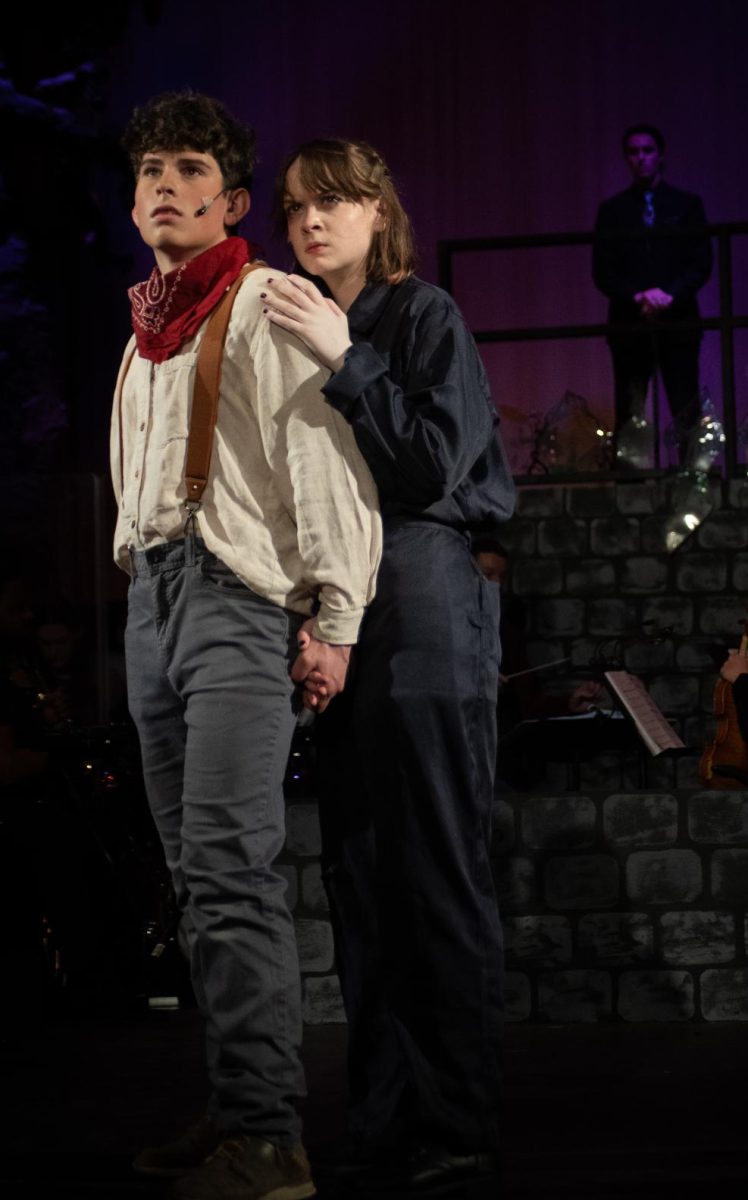Seattleites protest Trump’s policies and march in support of marginalized citizens
Ana Marbett and Claire Moriarty, Online Editor and Opinions Editor
Originally published February 9, 2017
Ana Marbett
Woman marches past cinema on 4th
“I think it’s really uniting after this very fractious election and really shining a light on the rights of people who’ve been marginalized and people who throughout this campaign are very concerned about the future,” marcher Jennifer Teunon said, “and so I think it’s a way of really bonding over that and rising up and having strength around those issues.”
We joined the march at Westlake Center, one of various entry points along the route. As the throng of protesters passed along the street, we merged with the stream of people moving towards Seattle Center. Thousands of marching people brandished signs and donned pink hats in support of the women in their lives.
“[The march] is an opportunity to show that we are united, whether you’re female, male, LGBTQ, or pro-Trump or anti-Trump, or even the Christians across the street, it’s an opportunity as Americans to get together and exercise our rights, to say what we think and make sure we’re being heard,” marcher Patty Hagar said.
As we soldiered on, onlookers stood stoically on corners, fists raised in defiance and support. These people were young and old, male and female. The simple fact of their presence allowed them to bridge gaps of age, gender and ethnicity and unite under a common goal: achieving equal rights for all human beings.
The knowledge that every person was behind the same values and was prepared to demand justice created a sense of familiarity and solidarity. The constant buzz of conversation tossed between complete strangers was punctuated by laughter that carried along the congested streets. Overflowing buses received a helping hand from the drivers of passing cars on their way to Judkins Park, who opened their doors to anyone they saw wearing a pink hat.
“I feel like now more than ever we have an obligation to stand up for the more marginalized communities that don’t have the power. ”
— Aana Lauckhart
“I think for me it’s really important to be in a community of like-minded people, and it’s really powerful to see all these different people come together and protest for something that they believe in,” Seattle Pacific University student Hannah Crooks said.
Although the march lacked any screaming chants, the signs carried spoke volumes. Popular sayings included “The Pussy Grabs Back!” and “Nasty Women Unite!” Less common signs bore creative messages such as “Get your Rosaries off my Ovaries!” and “America is great, stop the rhetoric.” “I’m here for my mom” was scrawled across a poster grasped by a young boy.
“It’s very powerful to see people of all ages and genders and races and identities,” Seattle Pacific University student Nico Bull said, “but it’s also really tragic to see all the young girls with these signs saying ‘love all women, even girls like me,’ and it’s just so sad to see that we have a president that makes even these young girls feel scared, and I think it’s cool to be here to gain awareness of how this is affecting everybody.”
The march was a show of support not just for women, but for all marginalized groups. A Native American woman spoke passionately and eloquently into a megaphone about the injustices faced by minorities. Filipina women stood on soapboxes and called for equal representation. People of every color marched alongside each other, determined to be heard.
“I feel like now more than ever we have an obligation to stand up for the more marginalized communities that don’t have the power,” Aana Lauckhart said. Lauckhart had organized a sign-making gathering in the morning. She provided artistic prints that read “Keep your policies off my body” and “Revolution.”
The message that the organizers of the original march intended to convey was a simple one: that women’s rights are human rights, no matter your religion, country of origin, sexuality, gender expression, age, disability or economic status.
“A march does not solve anything, but it’s a good place to come together, to gather, to take a moment, to see that we’re not alone,” Lauckhart said.
So, why do we march? We march for the girls who fear for their futures. We march for the sexual assault victims whose voices have been stolen.We march for the women who have been neglected and abused. And we march for the women emigrating to our country, hoping for a new beginning.
We march to show solidarity and support for these people, and to show our government that we will not be silent under the oppressive fist of our patriarchal society.

























